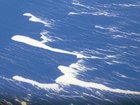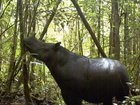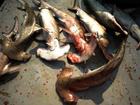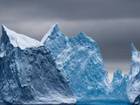The U.N. chief Sunday announced an initiative to protect oceans from pollution and over-fishing and to combat rising sea levels which threaten hundreds of millions of people.
United Nations Secretary General Ban Ki-moon said the initiative, called the Oceans Compact, sets out a strategic vision for the U.N. system to work more effectively to tackle the "precarious state" of the world's seas.
 Full Story
Full Story
A mass of small volcanic rocks nearly the size of Belgium has been discovered floating off the coast of New Zealand.
The stretch of golf-ball-size pumice rocks was first spotted this week by a New Zealand air force plane about 1,000 kilometers (620 miles) northeast of Auckland. The rocks stretch for about 26,000 square kilometers (10,000 square miles).
 Full Story
Full Story
A conservationist says seven of the world's rarest rhinoceroses were photographed at a national park in Indonesia. It is the first sighting there in 26 years.
Tarmizi, from the Leuser International Foundation, said Thursday that pictures from movement-triggered cameras identified a male and six female Sumatran rhinos in Aceh province's Leuser National Park as of April.
 Full Story
Full Story
Earlier this week NASA safely landed a robotic rover on Mars about 150 million miles (241.39 million kilometers) away. But on Thursday here on Earth, a test model planetary lander crashed and burned at Kennedy Space Center in Florida just seconds after liftoff.
The spider-like spacecraft called Morpheus was on a test flight at Cape Canaveral when it tilted, crashed to the ground and erupted in flames. It got only a few feet up in the air, NASA said.
 Full Story
Full Story
Scientists in Switzerland said on Friday they had devised software that can swiftly trace terror suspects, computer viruses, rumor-mongering and even infectious diseases back to their source.
"Using our method, we can find the source of all kinds of things circulating in a network just by 'listening' to a limited number of members of that network," said researcher Pedro Pinto of Lausanne's Federal Polytechnic (EPFL).
 Full Story
Full Story
The U.S. space shuttle Endeavour will arrive in Los Angeles next month before making its way across the city in October to its new home at the California Science Center, officials said Wednesday.
Endeavour, which completed its last mission a year ago, will be flown on the back of a modified Boeing 747 from Florida's Kennedy Space Center to Los Angeles on September 20, where it will remain for a few weeks in a hangar.
 Full Story
Full Story
Threatened shark species are being used to make shark fin soup, a delicacy in Chinese cuisine, in several U.S. cities, according to an unprecedented study based on DNA testing.
Thirty-three different species of sharks turned up in samples collected in 14 cities and analyzed at Stony Brook University's Institute for Ocean Conservation Science in New York.
 Full Story
Full Story
Modern man's forerunners shared the planet with at least two related species nearly two million years ago, scientists said on Wednesday, pointing to newly-unearthed pieces in a 40-year-old fossil puzzle.
Findings published in the journal Nature touch on the odyssey of our ancestor, the upright-walking early human known as Homo erectus.
 Full Story
Full Story
The United States ran into crossfire on Wednesday after it called for "flexibility" in climate talks, even if this approach could not guarantee meeting the U.N.'s target on global warming.
Europe demanded that the two-degree-Celsius (3.6-degree-Fahrenheit) objective set at the Copenhagen summit in 2009 be honored while small island states accused Washington of dangerous backsliding.
 Full Story
Full Story
Scientists found that Antarctica was covered by rain forests some 50 million years ago after the analysis of materials taken from the bottom of the ocean in the area, NBC reported.
The scientists said that if the temperatures kept increasing around the world at the current speed, the traces of the plants left under the ice could rise up and Antarctica could become green again.
 Full Story
Full Story



